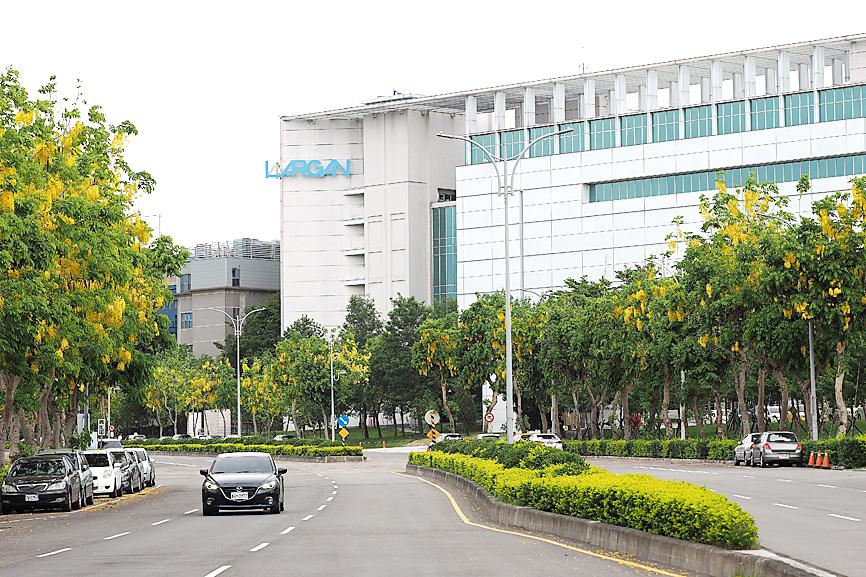Largan Precision Co (大立光), a leading smartphone camera lens supplier, on Friday said that it had bought back 672,000 of its own shares over the past two months, or 0.5 percent of its outstanding shares, for NT$1.4 billion (US$50.47 million).
The number of repurchased shares accounted for half of the shares that the company had planned to acquire on the open market to bolster its share price.
Largan shares on Friday closed 0.61 percent lower at NT$2,445 in Taipei trading, having dropped 23.47 percent since the beginning of this year due to weak revenue performance and a fall in profitability.

Photo: David Chang, EPA-EFE
During the buyback period, its stock price rose 21.33 percent, Taiwan Stock Exchange data showed.
On Oct. 26, Largan began to execute the company’s first buyback scheme, aiming to repurchase up to 1.342 million shares — or 1 percent of its outstanding shares — at NT$2,025 to NT$3,300 per share.
Largan said in a regulatory filing on Friday that the average repurchase price was NT$2,084, which is the highest for a listed company in Taiwan.
Last week, the stock rallied 7.71 percent after two foreign brokerage firms raised their target price for Largan shares to NT$2,600 and NT$2,990 respectively, on expectations that the Apple Inc supplier would benefit from an industry trend of adopting more high-end lenses per smartphone, as well as rising demand for automotive optical components next year.
As a leading maker of optical lens modules, Largan also produces real-image viewfinders and other optoelectronic parts.
Largan signed a long-term agreement with a top Chinese smartphone brand, TF International Securities Group Co (天風國際證券) analyst Kuo Ming-chi (郭明錤) said in a report on Monday, adding that orders to the Chinese client are expected to increase shipments 20 percent annually, compared with a previous forecast of shipments falling 15 to 20 percent.
Upgrades to iPhone cameras over the next two years would boost Largan’s market share, revenue and profit, Kuo said, without providing further details
Largan posted net profit of NT$13.54 billion in the first three quarters of this year, down 23 percent annually, with earnings per share of NT$100.91.
The firm’s cumulative revenue for the first 11 months dropped 16.79 percent year-on-year to NT$42.46 billion, company data showed.
Separately, the Taichung-based company on Friday gained approval to invest NT$34.2 billion in a plant expansion at the Taichung Industrial Park (臺中工業區) under the government’s “Invest in Taiwan” initiative, the InvesTaiwan Service Center said in a statement.
Largan has since last year started construction of the plants and installed smart machinery at the industrial park, the center said, adding that the investment is expected to create 2,500 jobs.
The company has pledged to continue to expand application services for smart handheld devices and focus on high-end production technology in Taiwan, the center added.

In Italy’s storied gold-making hubs, jewelers are reworking their designs to trim gold content as they race to blunt the effect of record prices and appeal to shoppers watching their budgets. Gold prices hit a record high on Thursday, surging near US$5,600 an ounce, more than double a year ago as geopolitical concerns and jitters over trade pushed investors toward the safe-haven asset. The rally is putting undue pressure on small artisans as they face mounting demands from customers, including international brands, to produce cheaper items, from signature pieces to wedding rings, according to interviews with four independent jewelers in Italy’s main

Macronix International Co (旺宏), the world’s biggest NOR flash memory supplier, yesterday said it would spend NT$22 billion (US$699.1 million) on capacity expansion this year to increase its production of mid-to-low-density memory chips as the world’s major memorychip suppliers are phasing out the market. The company said its planned capital expenditures are about 11 times higher than the NT$1.8 billion it spent on new facilities and equipment last year. A majority of this year’s outlay would be allocated to step up capacity of multi-level cell (MLC) NAND flash memory chips, which are used in embedded multimedia cards (eMMC), a managed

Japanese Prime Minister Sanae Takaichi has talked up the benefits of a weaker yen in a campaign speech, adopting a tone at odds with her finance ministry, which has refused to rule out any options to counter excessive foreign exchange volatility. Takaichi later softened her stance, saying she did not have a preference for the yen’s direction. “People say the weak yen is bad right now, but for export industries, it’s a major opportunity,” Takaichi said on Saturday at a rally for Liberal Democratic Party candidate Daishiro Yamagiwa in Kanagawa Prefecture ahead of a snap election on Sunday. “Whether it’s selling food or

In the wake of strong global demand for AI applications, Taiwan’s export-oriented economy accelerated with the composite index of economic indicators flashing the first “red” light in December for one year, indicating the economy is in booming mode, the National Development Council (NDC) said yesterday. Moreover, the index of leading indicators, which gauges the potential state of the economy over the next six months, also moved higher in December amid growing optimism over the outlook, the NDC said. In December, the index of economic indicators rose one point from a month earlier to 38, at the lower end of the “red” light.